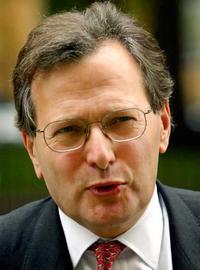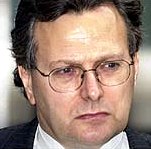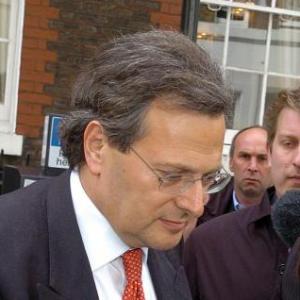|
LORD GOLDSMITH
|
|
HOME | CASE STUDIES | LAW | NEWS | POLITICS | RIGHTS | SCANDAL | SITE INDEX | WHISTLEBLOWING |
|
Peter Henry Goldsmith, Baron Goldsmith, PC, QC (born 5 January 1950), is the current Attorney General of England and Wales.
Lord Goldsmith QC was appointed on 11 June 2001 as Her Majesty's Attorney General.
Lord (Peter Henry) Goldsmith QC
The Attorney General, assisted by the Solicitor General, is the chief legal adviser to the Government. The Attorney General has overall responsibility for the Treasury Solicitors' Department, superintends the Director of Public Prosecution as head of the Crown Prosecution Service (CPS), the Director of the Serious Fraud Office (SFO) and the Director of Public Prosecutions in Northern Ireland.
The Law Officers answer for these Departments in Parliament. The Attorney General has public interest functions in which his responsibility is as guardian of the public interest.
Peter Goldsmith was born and brought up in Liverpool. He went to Quarry Bank High School/Comprehensive there before reading law at Gonville & Caius College Cambridge taking a double first class honours degree. After a Master's Degree at University College London he was called to the Bar, Gray's Inn in 1972.
He then practised from Fountain Court Chambers in London. He was appointed Queen's Counsel in 1987. He has judicial experience, sitting as a Crown Court Recorder since 1987 and a Deputy High Court Judge since 1994. He was created a Life Peer in 1999, and a Privy Counsellor in 2002.
In 1995 he was Chairman of the Bar of England and Wales. He has also held a number of posts in international legal organisations including Council Member of the International Bar Association and the Union Internationale des Avocats.
From 1998 until his appointment as Attorney General he was co-Chairman of the IBA's Human Rights Institute. Between 1997 and 2000 he was Chairman of the Financial Reporting Review Panel, an independent public body responsible for enforcing financial reporting standards. In 1997 he was elected to membership of the American Law Institute and made a member of the Paris Bar.
In 1996 he founded the Bar Pro Bono Unit of which he was Chairman until 2000 and remains President.
He was the Prime Minister's Personal Representative to the Convention for the European Charter of Fundamental Rights.
Goldsmith was born in Liverpool and educated at Quarry Bank School (now Calderstones School) before reading law at Gonville and Caius College, Cambridge and University College London. He was called to the Bar at Gray's Inn in 1972, practising from Fountain Court Chambers in London. He became a Queen's Counsel in 1987 and a Deputy High Court Judge in 1994 and he was elected the youngest ever Chairman of the Bar of England and Wales in 1995. He was created a Labour Life Peer in 1999, as Baron Goldsmith, of Allerton in the County of Lancashire, though this represents a reversal of his earlier support of the Conservative Party. He was appointed Her Majesty's Attorney General in June 2001. One of his first acts was to discuss breaches of the injunction against publishing the whereabouts of the offenders in the James Bulger murder case. He became a Privy Counsellor in 2002.
Lord Goldsmith has also held a number of posts in international legal organisations, including Council Member of the International Bar Association (IBA) and of the Union Internationale des Avocats. From 1998 until his appointment as Attorney General he was co-Chairman of the IBA’s Human Rights Institute. Between 1997 and 2000 he was Chairman of the Financial Reporting Review Panel, an independent public body responsible for enforcing financial reporting standards. In 1997 he was elected to membership of the American Law Institute and made a member of the Paris Bar.
In 1996 he founded the Bar Pro Bono Unit of which he was Chairman until 2000 and remains President.
He was the Prime Minister’s Personal Representative to the Convention for the Charter of Fundamental Rights of the European Union.
In 2006, Goldsmith gave a speech at the Royal United Services Institute, calling for the closure of the US-ran detention camp at Guantanamo Bay. Goldsmith called it a "symbol of injustice", and said that it did not respect the rights of liberty or freedom. [1]
On 17th February 2007, the Mail on Sunday reported that Goldsmith, who is married, had been having an affair with Kim Hollis, Britain's first Asian QC.[2] Lord Goldsmith is married with four children and lives in London.
Controversy over legal advice on the Second Gulf War
The nature of Lord Goldsmith's legal advice to the Government over the legality of the 2003 invasion of Iraq was a significant political issue in 2003 and early 2004.
The Government had turned down repeated calls to break with tradition and have the advice made public. Lord Goldsmith's original memo, written on March 7, 2003, was eventually leaked to the press, which led to its official publication on 28 April 2005. In the memo, Lord Goldsmith discusses whether the use of force in Iraq could be legally justified by Iraq's 'material breach', as established in UN Security Council Resolution 1441, of its ceasefire obligations as imposed by Security Council Resolution 687 at the end of the First Gulf War. Lord Goldsmith concludes that 'a reasonable case can be made that resolution 1441 is capable in principle of reviving the authorisation [of the use of force] in [Resolution] 678 without a further resolution.' However, Lord Goldsmith did concede that 'a court might well conclude that [operative paragraphs] 4 and 12 do require a further Council decision in order to revive the authorisation.'
In his final advice to the Government, written on March 17 2003, Lord Goldsmith stated that the use of force in Iraq was lawful. This advice stated Lord Goldsmith's preferred view in more unequivocal terms than his earlier memo, without reference to the doubts expressed therein. This has led to allegations that Lord Goldsmith succumbed to political pressure to find legal justification for the use of force against Iraq. Shortly after the leak Lord Goldsmith released a statement in response to such allegations, saying that the two documents were consistent, pointing to the difference in the nature of the two documents and the firm assurances he had received between 7th and 17 March that Iraq was indeed in breach of its obligations under Security Council resolutions.
The controversy was furthered by the resignation of Elizabeth Wilmshurst, deputy legal adviser to the Foreign Office, on 20 March 2003. A full version of her letter of resignation became public in March 2005. In this she stated that the reason for her resignation was that she did not agree with the official opinion that the use of force in Iraq was legal. She also accused Lord Goldsmith of changing his view on the matter.
Her Majesty's Attorney General for England and Wales, usually known simply as the Attorney General, is the chief legal adviser of the Crown in England and Wales. He represents the Queen and the Government in court, and has supervisory powers over prosecutions, which are the responsibility of the Director of Public Prosecutions and the Crown Prosecution Service. The Attorney General also represents the Crown in many judicial proceedings relating to the public interest, e.g. the administration of charities and income tax. He is assisted by the Solicitor General for England and Wales: both offices are filled by political appointees who must belong to either house of Parliament. The Attorney General is not usually a member of the Cabinet, but is called to advise it when necessary.
There are separate legal advisors for the other jurisdictions of the United Kingdom: see Law Officers of the Crown.
The Attorney General and the Solicitor General, despite their titles (an attorney in the common law courts was the equivalent of a solicitor in the courts of equity), have historically been barristers and Queen's Counsel. However, Harriet Harman QC MP, who was Solicitor General until May 2005, is a Solicitor. The Attorney General has precedence over all other barristers in the English Courts, and in the House of Lords has precedence over the Lord Advocate, even in Scottish cases. The Attorney General is addressed in court as "Mr Attorney".
As well as Her Majesty's Attorney General, there is also an Attorney General to the Prince of Wales and an Attorney General to the Duchy of Lancaster. When there is a Queen consort or dowager, she also has an Attorney General, as did the late Queen Elizabeth the Queen Mother.
Since 1973 the Attorney General for England and Wales has also held the office of Attorney General for Northern Ireland.
External links
WE ACCEPT NO RESPONSIBILITY FOR THE ACCURACY OF ANY FEATURED LINKS
|
|
IF YOU HAVE ANY GOOD STORIES TO TELL WE'D LIKE TO HEAR FROM YOU. WHY NOT BUILD A WEBSITE OF YOUR OWN TO TELL OF PROBLEMS IN YOUR AREA - IT'S YOUR RIGHT. WE WILL LINK TO YOUR SITE WITH A SHORT SUMMARY.
With thanks to Action Groups around the world for the supply of real case history and supporting documents.
|


